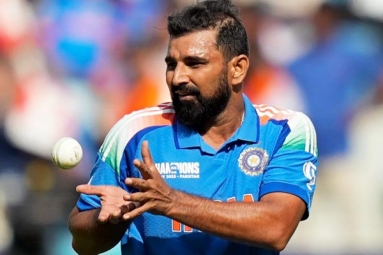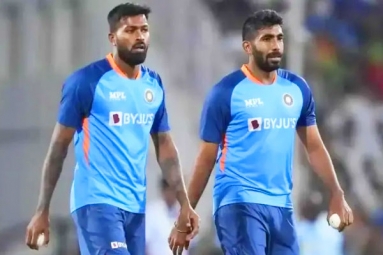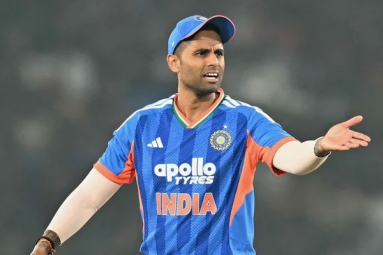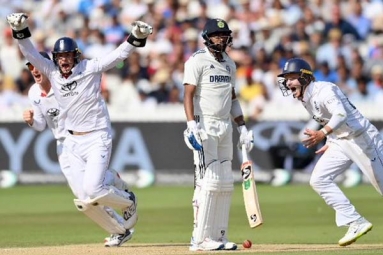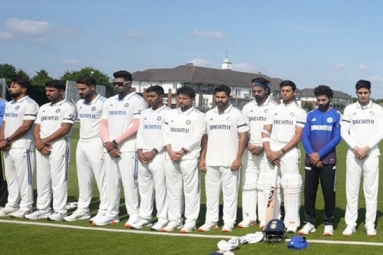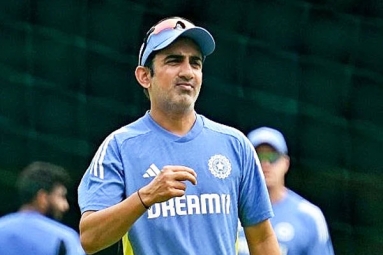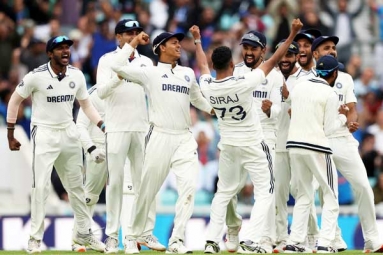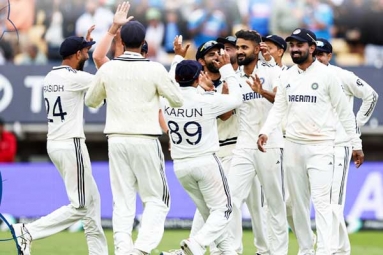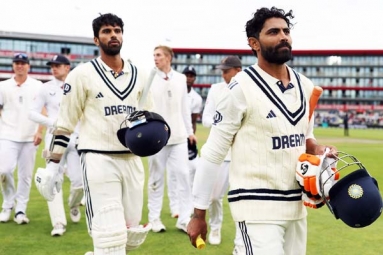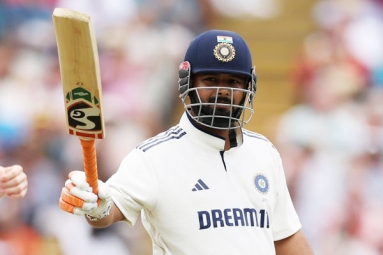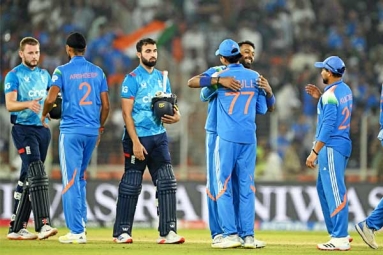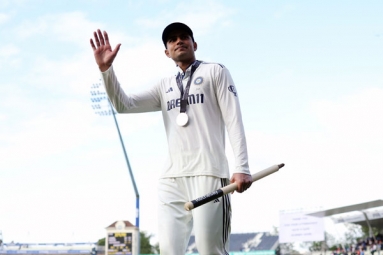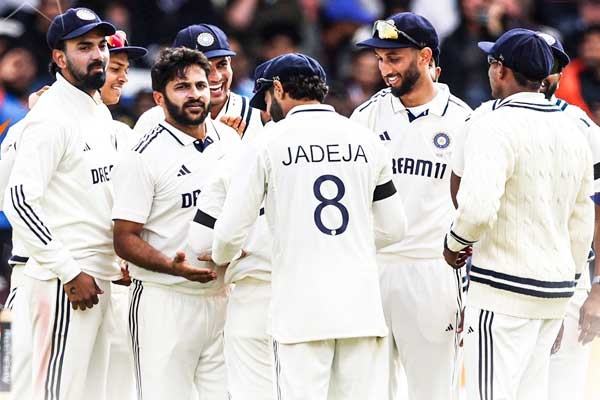
(Image source from: x.com/BCCI)
All of India’s prominent players have contributed significantly. Rishabh Pant has impressively recorded two inventive centuries, while the opening batsmen have demonstrated their skill with elegant centuries in each innings. Their captain has made a superb century, and the key bowler has completed one of his three planned Tests with a five-wicket haul. Despite this, the team finds itself trailing 1-0 after suffering a surprising defeat in a Test that seemed impossible to lose.
To highlight the obvious issues, the last four batsmen collectively gathered just nine runs across both innings, resulting in collapses of 7 for 41 and 6 for 31, all occurring under quite benign conditions. They committed more dropped catches than any other side has in a Test match in England over the past two decades. The third and fourth fast bowlers failed to provide both control and wicket-taking ability. They had the opportunity to dominate England on the second day but failed to capitalize. A substantial lead could have been established had they managed to hold onto their catches, yet they didn’t. They could have again put England under pressure on the fourth day, but once more, they missed the chance.
Captain Shubman Gill faced a formidable challenge, tasked with guiding a developing bowling attack at one of the more unique cricket grounds globally, against opponents who, while not as skilled as some of India's recent rivals, are nonetheless formidable contenders. A newly formed slips cordon needed to adapt to fielding at a level a foot or two below the pitch, and bowlers had to quickly learn to run up and down the incline. Due to their batting errors, they were often forced into a defensive position at a notoriously challenging ground where boundaries were easy to find. Additionally, Gill had to manage a situation where his leading bowler can only participate in three Tests.
Nevertheless, Gill must establish firm authority moving forward. It was not too long ago when India’s lower order was known for its resilience and determination to fight for every run earned. During their most recent tour to England, the team gained an advantage thanks to contributions from the tail end. The issue wasn’t solely that the last four batsmen totaled just nine runs in two innings; dismissals are part of the game, even for specialized batsmen. The real problem lay in the manner of those dismissals. They played recklessly, showcasing an extravagant batting style without adjusting to the conditions, even with a competent batter at the other end. Shardul Thakur was selected specifically for his batting capabilities, yet he fell victim to expansive drives after just his eighth and twelfth balls faced.
Gill needs to reflect on what the situation would have looked like if the tailenders had adopted such a relaxed demeanor when Virat Kohli or Rohit Sharma was at the helm. In that same match, it happened once, and even twice. It won't be long before Gill understands that while a positive atmosphere and mutual respect in the dressing room are valuable, a certain level of respect for the authority of the leaders is also essential. The failure of the lower order wasn’t the sole reason for India’s defeat in a match they should have won; it was indicative of a broader decline in concentration that a captain must be vigilant against. Success in Test cricket hinges more on maintaining a high level of play over extended periods than merely on moments of brilliance. This underlines why having a lineup of four competent fast bowlers is preferable to relying on one exceptional bowler alongside one decent one and two average performers. Competing for six hours daily over five days—or more—demands fitness, intensity, and a relentless approach.
On the final day, when none of the key players found their rhythm, India appeared to lack a clear strategy for delivering a steady sequence of overs. Jasprit Bumrah should be given the opportunity to have a day off from delivering remarkable deliveries every single over. Bowling decisions should not rely solely on the statistics of the day. Mohammed Siraj, who was the standout bowler on the last day, was notably absent from the attack between overs 42 and 80, which encompassed 39 overs and included two rain interruptions. Ravindra Jadeja took longer than necessary to adjust his line wider into the rough, which could have tested Ben Duckett’s reverse sweeps. In a Test match where only a couple of mistakes can be made, their impact might seem minimal, but collectively, these errors accumulate.
Moreover, this marked India’s poorest fielding display in quite some time. Thakur mishandled a ball after slipping but took too long to get back on his feet to fetch it. As Rishabh Pant was heard on the stumps mic stating, “It’s fine to misfield, but recovery is key.” This should have been a message from Gill. If one were to take a step back and observe the entire field as events transpired on the last day, it would have been difficult to perceive Gill as the one in charge. At different moments, both Pant and KL Rahul were seen setting fields and communicating with the bowlers.
The primary task facing Gill and Gautam Gambhir will be to rally the team following a Test defeat, during which they utilized one of their three key strategies, and saw beneficial performances from their four seasoned batsmen. Previously mentioned in this space, Gill's genuine challenge will arise if he opts for Thakur as the bowling all-rounder and the strategy falls short. Ideally, he would acknowledge the necessity to secure 20 wickets and consider bringing in a specialist bowler, perhaps Kuldeep Yadav. However, their recent collapses provide ample justification for a cautious approach.
What began as a fairytale captaincy debut for Gill has turned into a challenging scenario. With only six first-class games under his belt as captain, he deserves some leeway, but this role is laden with both honor and significant responsibility. Quick adaptation is crucial for him, as there's no straightforward solution to balancing compassion with instilling a sense of urgency and accountability. It is important to note that the players are feeling the heartbreak of this defeat deeply, perhaps more so than those on the outside can perceive. They will need to recover and replicate their successful strategies, while ensuring that their fervor does not wane. The England bowling attack can be exploited; they need their bowlers to consistently target the right areas more effectively than they did at Headingley, and they must be alert in the field. If there is a silver lining, it is that similar comebacks have occurred in the past. Kohli’s inaugural Test as captain is often recalled for his remarkable twin centuries, although that match also featured questionable selections and collapsing lower-order performances. In his first series leading the team full-time, Kohli began with a loss in what seemed like an unlosable Test in Galle. While there may be room for discussion on various matters, it is difficult to overlook the improved focus and intensity in the team following that experience.






